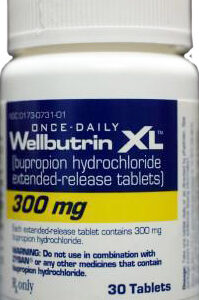Wellbutrin Medication Overview
Wellbutrin, with the generic name bupropion, is an antidepressant medication primarily used to treat major depressive disorder (MDD) and seasonal affective disorder (SAD). It can also be used off-label for other conditions, such as attention-deficit/hyperactivity disorder (ADHD) and smoking cessation. Wellbutrin belongs to the aminoketone class of antidepressants and works by inhibiting the reuptake of neurotransmitters noradrenaline and dopamine.
Dosage Forms and Strengths
Wellbutrin is available in three formulations: immediate-release (IR), sustained-release (SR), and extended-release (XL). The IR formulation is typically administered three times daily and is available in 75 mg and 100 mg tablets. The SR formulation is available in 100 mg, 150 mg, and 200 mg tablets and is usually taken twice daily. The XL formulation is once-daily, with tablets available in 150 mg and 300 mg strengths. There is also a 450 mg XL tablet available for some indications.
Indicated Usage and Administration
For the treatment of MDD, Wellbutrin is started at 200 mg per day, given as 100 mg twice daily, increasing after several days to the target dose of 300 mg per day. For SAD, Wellbutrin XL is started in the autumn before symptoms appear and continued through the winter season. The starting dose for smoking cessation is 150 mg once daily, which after a few days may be increased to 150 mg twice daily. It’s essential to swallow Wellbutrin tablets whole, without crushing, dividing, or chewing them.
Pharmacological Mechanism
The exact mechanism of Wellbutrin’s antidepressant effect is unknown. However, it is thought to be related to its ability to inhibit the reuptake of noradrenaline and dopamine, which would result in increased availability of these neurotransmitters. Unlike many other antidepressants, Wellbutrin does not inhibit the reuptake of serotonin and is therefore considered to have a minimal risk of sexual side effects.
Drug Interactions and Considerations
Wellbutrin should be used with caution when taken with other medications that lower the seizure threshold, such as antipsychotics, tricyclic antidepressants, and theophylline. It can also increase the effects of alcohol and other sedatives. Additionally, bupropion is a strong inhibitor of the cytochrome P450 2D6 enzyme and can affect the metabolism of drugs such as SSRIs, beta-blockers, and antiarrhythmics. Combining Wellbutrin with monoamine oxidase inhibitors (MAOIs) is contraindicated.
Adjustments for Specific Populations
Dose adjustments may be necessary for patients with hepatic impairment, as bupropion and its active metabolites may accumulate to a greater extent than usual. For individuals with renal impairment, reduced frequency and/or doses may be warranted to prevent excessive drug accumulation. Wellbutrin is not recommended for use in individuals less than 18 years of age. In older adults, careful dosing and monitoring are necessary due to the potential for increased sensitivity and the risk of side effects.
Potential Side Effects
Common side effects of Wellbutrin include insomnia, headache, dry mouth, dizziness, weight loss, nausea, constipation, and sweating. Seizures are a serious side effect but are more likely at higher doses. Hypertension is another potentially serious side effect and can occur whether the patient has a history of hypertension or not. Patients should be monitored for neuropsychiatric symptoms such as changes in behavior, hostility, agitation, and depression.
Monitoring Parameters
Throughout Wellbutrin therapy, monitoring blood pressure is recommended due to the risk of hypertension. It is also advisable to monitor for the emergence of neuropsychiatric signs or symptoms. For patients with a pre-existing seizure condition, regular monitoring of the seizure frequency and severity is critical. Regular assessment of mental status is recommended to detect any exacerbation of depression or the emergence of suicidal thoughts.
Overdose Management
In case of overdose, provide immediate medical attention. Treatment should include ensuring an open airway, monitoring cardiac rhythm and vital signs, and administering activated charcoal, which may reduce absorption. There is no specific antidote for Wellbutrin overdose; hence, treatment is supportive and symptomatic. Close observation and monitoring in a medical facility are recommended, and individuals should be screened for the risk of multiple drug ingestion.
Storage and Handling Instructions
Store Wellbutrin at room temperature, between 68°F to 77°F (20°C to 25°C), away from light and moisture. Medication should be kept out of reach of children and pets to prevent accidental ingestion. Dispose of any unused or expired medication appropriately, following local regulations, and never share medication with others, even if they have the same symptoms.
Prescription and Usage Compliance
Wellbutrin is a prescription medication, and usage should comply with the prescribing physician’s instructions. Abrupt discontinuation should be avoided due to potential withdrawal effects, including headache, nausea, and changes in mood. Titration up or down should be done gradually under medical supervision. Patients are encouraged to adhere to scheduled appointments for proper monitoring and dose adjustments.




Reviews
There are no reviews yet.